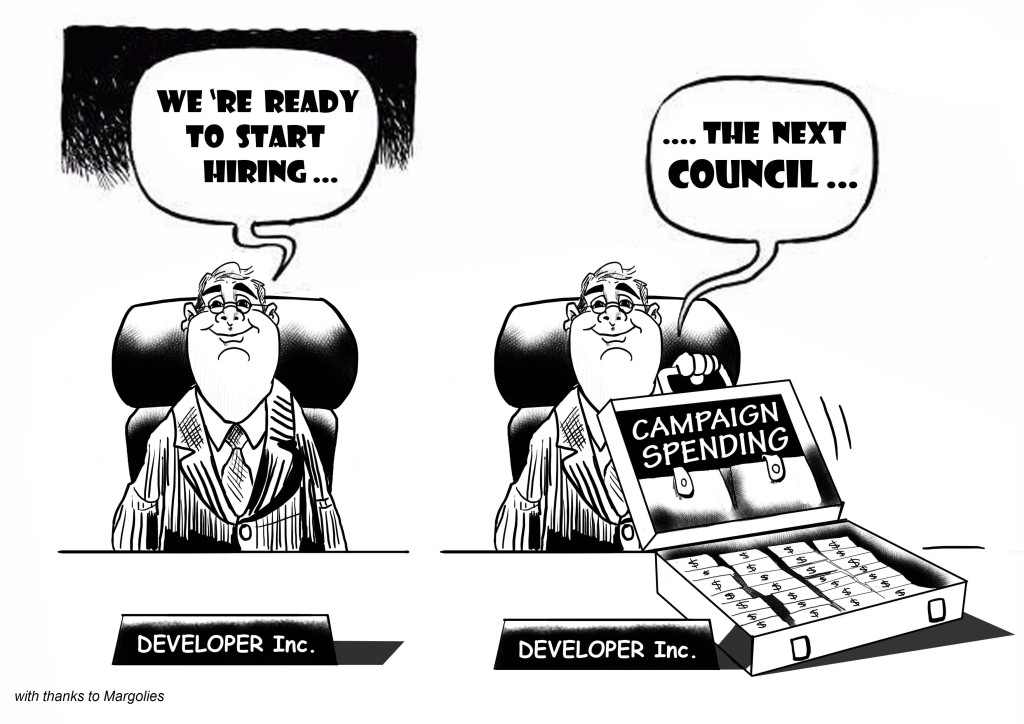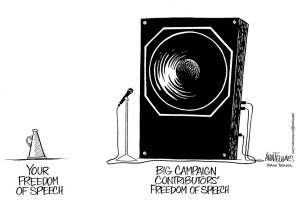
I recently asked Redland City Council to write to the State Government expressing support for changes to the Local Government Electoral Act that would:
• Put a cap on political donations: and
• Stop developers making political donations.
Now, I have incorporated these proposals into an
e-petition to the Queensland Parliament
Please sign this petition if you want to support these proposals.
Why is it important to raise this issue now?
The Courier Mail recently reported that the State Government would consider this issue.
NSW already bans developers from making political donations with legislation recently confirmed by the High Court.
It has been reported that NSW Premier Mike Baird will raise the need for standard donation laws at the next COAG discussions. It would be nice to have a uniformity of laws across the country and at every level of government. I hope that as many people as possible sign this petition. I hope that Councils across the land will follow and ask for nationwide reform.
A few questions
- Do developers expect a benefit when they donate?
- Are campaigns a ‘level playing field’?
- Are candidates who receive donations possibly influenced by the views of a large donor?
- Why should developers be singled out?
- Do we all have one vote, and equal say on government decisions?
What does the High Court of Australia think?

The High Court of Australia recently asked itself these questions. Their response should give confidence to Governments that they can be bold in changing the way campaigns are financed.
The High Court was asked to consider an appeal against the NSW legislation from a property developer who argued that the laws preventing him from making political donations infringed his ‘political freedom of speech’. The Court’s judgement found that the laws were Constitutional and desirable. As the High Court summarised:
…the public interest in removing the risk and perception of corruption is evident.
The Court said:
There are different kinds of corruption. A candidate for office may be tempted to bargain with a wealthy donor to exercise his or her power in office for the benefit of the donor in return for financial assistance with the election campaign. This kind of corruption has been described as “quid pro quo” corruption. Another, more subtle, kind of corruption concerns “the danger that officeholders will decide issues not on the merits or the desires of their constituencies, but according to the wishes of those who have made large financial contributions. This kind of corruption is described as “clientelism”. It arises from an office-holder’s dependence on the financial support of a wealthy patron to a degree that is apt to compromise the expectation, fundamental to representative democracy, that public power will be exercised in the public interest. The particular concern is that reliance by political candidates on private patronage may, over time, become so necessary as to sap the vitality, as well as the integrity, of the political branches of government.
The Court judgement also discusses how large donations give donors greater access and voice in government. As Griffith Law School’s Professor Graham Orr said, this is all about “the grand principle of an equal opportunity for equal voice for all; the idea of one person, one vote.’
The question was asked, why single out the development industry? The Court said:
New South Wales submits that the degree of dependence of property developers on decisions of government about matters such as the zoning of land and development approvals distinguishes them from actors in other sectors of the economy. Property developers are sufficiently distinct to warrant specific regulation in light of the nature of their business activities and the nature of the public powers which they might seek to influence in their self-interest, as history in New South Wales shows. These submissions of New South Wales should be accepted.
It’s common sense isn’t it?
It’s obvious isn’t it? You don’t need the High Court to tell you that there is a problem here. Common sense and 12 years of raw experience as a Councillor, scream at me that these laws needs to be enacted in Queensland.
In my opinion, developer donations are cancerous.
Donations are a lever which enable developers to bias the system. Its obvious that business self interest is their motivation. Developers donate to people who will favour their interests. And, because the system already guarantees certainty in most development decisions, it is only the developers who are involved in controversial projects who donate. It appears that the riskier the project, the more likely a developer will resort to making political donations to get their project over the line. And the larger the project, the more resources they are prepared to commit. And if this kind of project gets approved, the community is more likely to pay for it, one way or another.
This is an incredibly important problem for Australia. Bad planning and development decisions cost the country billions of dollars. Bad planning costs our environment, our health and in wasteful spending on infrastructure. Anyone who argues that we need to continue to allow developers to fund elections – because the alternative is that the public will have to pay for elections – has no understanding of how much the public is paying for bad planning and development decisions.
Raw Experience in the Redlands
In my 12 years in Council, the most divisive issues have been controversial planning decisions. The 2004-2008 Council operated under a cloud with widely held perceptions of undue developer influence.
We saw the influence of money at our 2012 election. The incumbent Mayor refused to accept development donations, and mortgaged her house to finance the campaign. In a one sided campaign the overwhelming weight of donated money was behind her challenger, the current Mayor.
Four years later, we see deep community suspicion about the current Council.
The current Mayor reported herself to the CCC, but they decided not to investigate her. The whole issue here is that this stuff is illegal in NSW – it isn’t here in Queensland.
There are other legal loopholes that need to be addressed:
- the current system does not force candidates to declare their donations until after an election. Too late. Especially if a candidate denies receiving developers’ donations.
- candidates do not have to declare names of donors where the donation is under $200, for local government elections. Electors can never know if larger donations are being concealed through lots of smaller donations.
- the dollar amounts of donations made AFTER an election, even very soon after, are not declared.
- the donations made to third party groups, who run negative campaigns against opposition, are not seen as donations to the candidate – even in two horse races.
- our legislation does not deal well with ‘in kind’ donations – the use of offices, support staff etc
Here in the Redlands we will soon go to the polls to elect a new Council. The City Plan (development regulations) will not be finalised, and there are developers who are keen to see it goes their way. Of course, they will take an active interest in the election.
There are a number of good people with strong views about the future of the Redlands. Many would like a chance to put those views to the community but are concerned that the playing field is not level.
It could be different
Imagine a future where:
- the only thing that divides Councillors (and parliamentarians) is a difference of opinion
- the merits of developments are the basis of government decisions
- elections are a contest of ideas and not a contest of dollars.
Our finances will be better for it, the environment will be better for it, and our community will be better for it…it’s a no-brainer.
We need action now,. You can help by signing my e-petition.
Craig Ogilvie
12 November 2015
Republished by Redlands2030 – 21 November 2015
Please note: Offensive or off-topic comments will be deleted. If offended by any published comment please email thereporter@redlands2030.net
3 Comments
A very important conversation here by Cr Craig Ogilvie. It makes sense to have a transparent government.
Do developers expect a benefit when they donate?
Are campaigns a ‘level playing field’?
Are candidates who receive donations possibly influenced by the views of a large donor?
Why should developers be singled out?
Do we all have one vote, and equal say on government decisions?
I share Craig’s view that donations from developers can become a lever which enable developers to bias the system. This is a very important discussion with Redland’s council elections pending. Please give it some consideration.
I signed Craig’s petition & wholehartedly support this initiative. Unfortunately I doubt there’s much likelihood of this going anywhere. There is far too much external influence at every level of Australian Government and I support any and all measures to root it out though political donations are so entrenched that I just can’t see this going anywhere.
Ultimately, what is considered undue influence or corruption depends very heavily on context and your political persuasion. Approached from this perspective, I doubt any of the Redland City Councillors could claim to be 100% independent.
In addition to those having received funds from developers as well as a variety of business and personal donations, some Councillors are card-carrying members of the LNP whilst others are backed and supported by groups such as CARP or receive favourable or unfavourable press and coverage from media such as Redlands2030. I personally supported Karen Williams campaign by assisting with her website. Whether any of these angles be considered undue or incorrect depends entirely on your point of view.
The best answer is to work towards having as little of this kind of thing involved as possible hence Craig’s consideration to rate/taxpayer funded campaigns makes far more sense & could be considered to be more democratically ‘fair’.
On donations, People give money to favourite candidates election time. Wealthy developers who own land waiting to fill will dig the deepest to obtain promises/agreements of getting what they want in due course. As my late husband said: “we can all be bought”. But…there has to be legislation in place where NO amount of money or influence, can buy places of high value that belong to the people, all of the people…i.e. heritage structures, core wildlife habitat mapped locations, waterway riparian zones, established neighbourhood parks, that have been provided in well planned communities for the sole enjoyment, health, and wellbeing of its people.